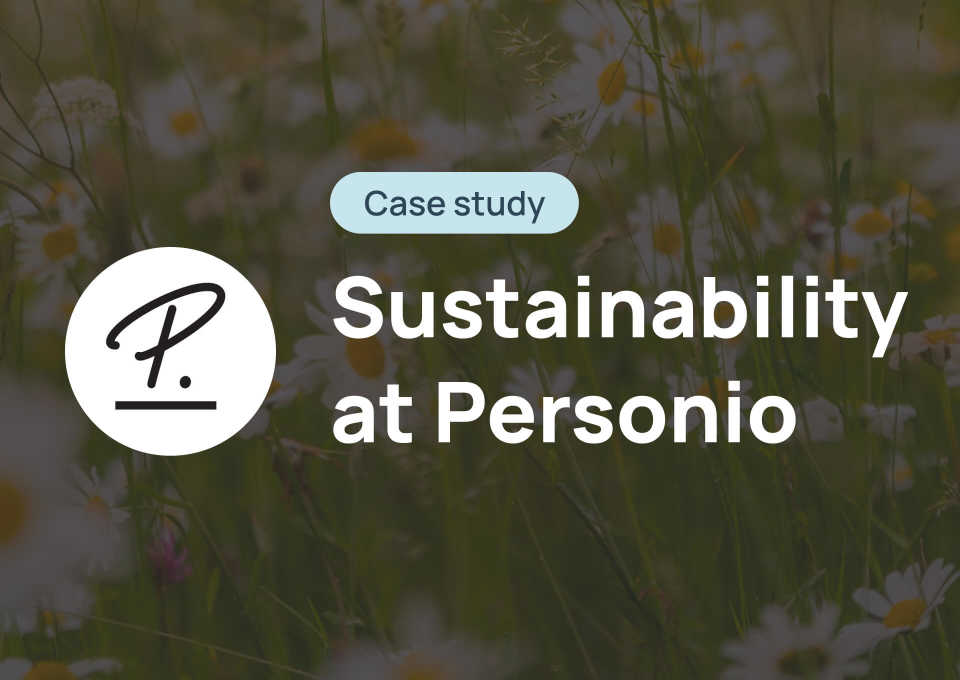As a personalized, all-in-one HR software, Personio is all about efficiency and precision. Digitizing and simplifying time-consuming HR processes for their thousands strong (and growing) customer base, spanning across Europe, they have also thrown their weight into the climate neutral movement.
We sat down with their Lead Product Manager, Dr. Fabius Steinberger, to discuss the organization of their Sustainability Committee, plus the company’s efforts to measure, reduce, and offset carbon emissions as well as their general commitment to improving corporate sustainability.
‘Personio is a tool to support HR teams throughout the entire employee life cycle. Our mission as a company is ‘enabling better organizations’. The way we read this mission is that it includes enabling greener organizations, more diverse organizations, and also distributed organizations.’
Grassroots beginnings
While most of Personio’s team members have shared sustainability values from the very beginning, concrete and measurable climate action on a company level was started with founding the Sustainability Committee, aka the Green Team. This grassroots initiative is composed of employees from all different departments, joined by a shared passion for climate action.
The idea took seed amongst the individuals in the company who sought to make a positive impact. After realizing they were not alone in their vision, they gathered together, and met with their CEO and founder, who explained that they felt the same way and encouraged the creation of an organized Sustainability Committee.
Given this support, they began inviting others who would be interested to join, ensuring that they had all departments, nationalities, and genders represented. This was about a two years, and the team continues to grow with representatives from international offices regularly joining. The Sustainability Committee started out with 15 core members - these core members focussed on topics such as Green Product, Green Offices, Green Brand, Green Finances, and Green Mobility. Each focus team self-organized to reach their quarterly goals (Green OKRs) and usually met every two weeks. The full committee gathered together twice per quarter to set goals, check in, and celebrate progress.
As a hypergrowth company, Personio has tripled its headcount from 250 people at the inception of the Sustainability Committee in 2019 to currently 800 people. To respond to this growth, the committee has transitioned to a more open and inclusive model where anyone (not just core members) can contribute. This means that all employees are invited to swarm around green initiatives, switching between active and passive participation in line with their capacities and interests.

Stepping stones
1. Start with your team
Ever since Personio was founded in 2015, it had a range of climate-friendly incentives for team members, including a Climate Neutral commute program which offered an electric scooter or free public transport ticket, as opposed to using a company car.
Slowly there have been larger shifts in thinking, catalyzed by the Sustainability Committee beginning to offset their carbon emissions and joining the LFCA community. These steps pushed them to begin thinking more realistically and specifically about initiatives that were initially abstract and intuitive.
2. Join a like-minded community and get guidance
Personio’s founder and CEO, Hanno Renner joined the LFCA pledge and encouraged the coordinators of the Sustainability Committee to join the LFCA community too as Climate Officers for the company, in addition to their regular responsibilities. Some of the tasks, such as measuring and analyzing their carbon footprint, allowed them to be held accountable for the pledge that was made. LFCA also serves as a platform to discuss and share experiences and gather ideas from like-minded teams. Fabius noted that being a part of the LFCA’s Slack community broadened his horizons, allowing him to realize that so many other companies are tackling the same climate-related challenges in lots of different ways, thus making it a perfect source of inspiration for Personio’s own actions.
3. Consider climate neutrality as a basic step and explore reduction potential
As a company, Personio has already achieved basic climate neutrality. By measuring and compensating for their full carbon footprint, they help to decrease the damage that their emissions are causing.
Personio’s product is 100% digital, therefore, most of their footprint is caused by cloud infrastructure. Their product, which is currently used by about 3000 organizations in Europe and beyond, is hosted on Amazon Web Services (AWS). The largest cloud provider, AWS, could be more ambitious to become entirely green, although they are committed to reaching full climate neutrality by 2030. As it is the most advanced provider, it is difficult for many companies relying on its services to switch to greener alternatives. However, Personio has chosen to only use one of the AWS data centres in Frankfurt which is claimed to be climate neutral.
In terms of the office scope, business travel had a large impact on the company’s carbon footprint pre-Covid. To change that, Personio has implemented policies where the default is train travel for journeys within the same country, a measure which has been well received overall. Furthermore, when they interview new candidates, they always try to book a train, using this as an initial opportunity to explain to their new hires about the company’s sustainable values and objectives.
As the latest carbon footprint analysis has shown, the use of services from third party suppliers presents the single biggest source of emissions for Personio. As a result, the team has started to explore best practices to address this impact.
4. Go the extra mile: explore how you can leverage your product
Personio supports the climate strikes wholeheartedly and encourages their own team members to participate. In 2019 they even made the daring decision to go the extra mile and motivate thousands of their users to follow this lead: on the days of the Global Climate Strikes they added an empowering message and call to action on their main log-in page. As this is one of their most visited webpages, this created additional exposure for the strikes with little effort to implement, and was received with mostly positive feedback.
In line with the company’s mission to enable better organizations, Personio supports climate protection non-profit organizations on their mission by making their people processes more efficient so that the teams can focus on what they're best at.

Communicate about sustainability internally and externally
Within the company there are two main communication channels through which the message of climate action is spread.
Onboarding: The first is during an onboarding session all new employees attend, in which the Sustainability Committee is presented and the company values on this topic are explained. Due to Personio’s fast growth, this session provides a great springboard for every newcomer.
Slack channel: The other communication route is a public Slack channel which serves as a home for sustainability conversations. It is open to anyone who is interested and is a place for sharing new ideas and climate action suggestions. For example, one idea that arose from this channel was to ensure that the company’s book purchases were made either from local bookstores or in the form of digital books. Fabius noted that this was an organic suggestion from the employees at large, not something pushed by the Sustainability Committee, indicating that the many employees care about the topic of sustainability.
Website & social accounts: In terms of communicating their climate neutral status publicly, the company feels that this will soon be a basic ‘must have’ for all companies. Rather than being a way to simply market themselves, this is more of a way to quietly do their homework. Occasionally they share their learnings or experiences through social media channels, and analytics have shown that followers are particularly interested in these posts.
Streamlining organization to speed up the transformation
Based on a recent yearly retrospective, Fabius and the Sustainability Committee have some ideas about how to move forward. Although the voluntary basis of the committee accurately reflects the spirit of the company, this can also mean that they lack the mandate and dedicated funds to execute some of their green initiatives. Therefore, one of their ideas is to make green objectives a regular business priority across all departments. Another is to shift into a slightly more proactive role in the company, approaching executive levels with suggestions and requesting guidance and support as necessary.
While some subjects, such as green mobility and reducing air travel, are clearly on hold this year, others, such as green product integrations, are now receiving more attention as the Sustainability Committee asks themselves how to inspire, influence, and enable the growing customer base to enter a carbon neutral economy.
Part of their mindset is that due to their fast growth, whatever actions are taken now will be planted like seeds which will flourish and bloom in the future.
A win-win for sustainability and business
From the perspective of Fabius and the Sustainability Committee, every company is excellent at something and provides a unique value to their customers. By understanding and leveraging this unique strength, organizations can come up with new, creative green initiatives which are simultaneously good for the environment and good for business, noting that if anyone manages to monetize green initiatives, no CEO would be able to say no!
‘I would recommend having a curious mind and begin by exploring how your company is doing right now in terms of sustainability. Invite your employees and provide a platform for them to do this exploration. Mentally going through each department, you’ll be surprised how quickly ideas and suggestions arise! My main recommendation would be: think about what makes you one of a kind, and understand how you as an org, as a brand or as a product are uniquely positioned to do something that others cannot do. Once you understand that, you’ll be able to build upon this uniqueness and contribute to climate action in a way that’s aligned with the company’s mission.’


